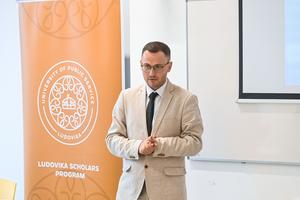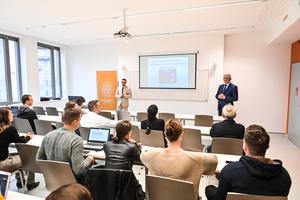Michal Jasinski, Assistant Professor at Wroclaw University of Science and Technology, gave a public lecture on the role of machine learning and artificial intelligence in open-source information gathering. Michal Jasinski visited Budapest as part of the Ludovika Scholars Program for guest lecturers hosted by the National University of Public Service (UPS).
On 27 March 2023, the public lecture titled "What AI system knows about open-source information gathering in cyberspace" was kicked off with an improvised poll by Michal Jasinski, asking the members of the audience about their support for the use of AI. Most of the participants expressed a positive attitude towards AI, with a majority of them explicitly in favour of its use, while some were rather neutral about the technology because of its infancy. The number of those opposed to the use of AI, having a negative attitude towards its application, was negligible.
During his presentation, Jasinksi pointed out that artificial intelligence today has a wide range of applications, including in health, education and transport. Artificial intelligence systems work with huge amounts of data, making the work of those who use open-source information-gathering techniques much easier.
The example of ChatGPT is a good example of the need for large amounts of high-quality, cleansed and labelled data to train artificial intelligence. The existence of systems based on a generative language model that are available to the public facilitates rapid search and delivery of information on the Internet. For those who want to access openly available information on the web, the use of ChatGPT can be a tempting solution, as such tools can work faster than humans with large amounts of information and can discover patterns that humans cannot. However, there are risks in using this technology, as these systems are far from perfect these days. In his presentation, Michal Jasinski illustrated how ChatGPT, for instance, performs very poorly when it has to list the sources that it has processed to provide an answer. The authors and titles of papers that the system displays are often not actual articles, but articles "made up" i.e. generated by artificial intelligence.




